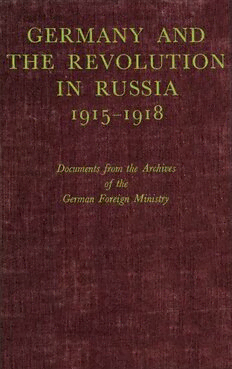
Germany and the Revolution in Russia, 1915-1918: Documents from the Archives of the German Foreign Ministry PDF
184 Pages·1958·13.051 MB·English
Most books are stored in the elastic cloud where traffic is expensive. For this reason, we have a limit on daily download.
Preview Germany and the Revolution in Russia, 1915-1918: Documents from the Archives of the German Foreign Ministry
Description:
The aim of this collection of documents is to give a picture of the policy of the Imperial German government towards the revolution in Russia and also of some of the information available to this government on which the policy was based.The documents printed here divide into four periods: January 1915 till March 1917, from the time of the first records of Germany’s interest in the revolution till its outbreak in March. The second period runs from March 1917 till the Bolshevik seizure of power. It includes the transport of the Russian revolutionaries through Germany. Lenin’s contingent was the first of these transports; later, a number of them was organized from Switzerland and Belgium. The criterion the German government used for their approval was the attitude of the men who were to be allowed transit through Germany to the question of continuation of the war.The third period covers November and December 1917, starting with the German reactions to the Bolshevik seizure of power, and ending at the time of the failure of Radek’s and Helphand’s plan for a conference on neutral territory and the opening of the peace negotiations at Brest-Litovsk. No documents on these negotiations are printed here: it is a feature of German- Russian relations which has been well covered both by publications of original sources and by secondary works. The documents in the German Foreign Ministry Archives, covering the Brest- Litovsk negotiations, have been filmed and are available at the Public Records Office in London and the National Archives in Washington.The two letters from Ludendorff and from Mirbach (documents Nos. 134 and 136) are a suitable epitaph to the German policy towards the revolution in Russia.
See more
The list of books you might like
Most books are stored in the elastic cloud where traffic is expensive. For this reason, we have a limit on daily download.
